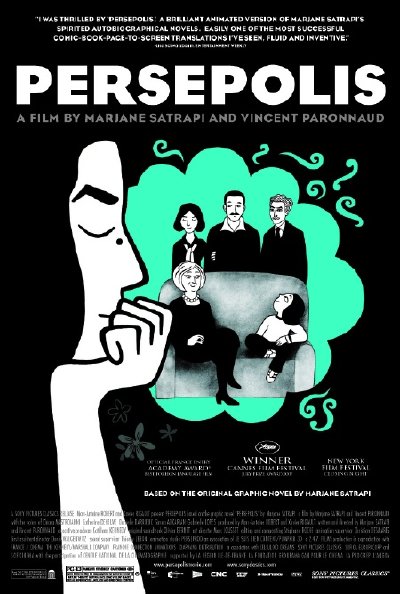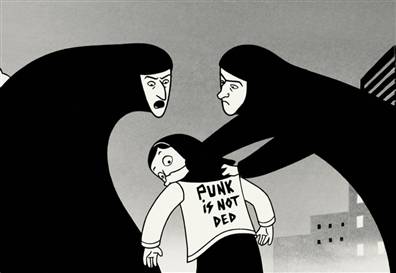
1/26/08
I bought Anjali the Persepolis books by Marjane Satrapi several years ago. I’m always eager to get her hooked on comics, and I don’t expect her to develop a Grant Morrison fascination any time soon. Despite my curiosity, I only looked at them a bit, and never committed to reading them all the way through. Anjali did, however, and went on to read all of Ms. Satrapi’s other comics as well, becoming quite a fan. She’s been waiting for the animated film version of Persepolis to hit Portland, and was so eager to see it that we saw it opening night after watching Sedotta e abbandonata down the street.
Having only glanced at the original Persepolis comics I had some idea of the story that was going to be told and what it was going to look like, but not where it was going to go. I really liked the way the look of the comics was transferred to animation. I appreciated the black and white look, and the simple yet affectionate renderings. I thought the film worked very well visually, both in humorous scenes of Marjane as a Bruce Lee-obsessed child, and in brutal scenes of tanks rolling over the land, and mass executions of dissidents. With a few simple lines, the characters come alive, especially Marjane’s mother, her grandmother, and her Communist uncle Anoush.
Unfortunately the movie could’ve used more clarity in the narrative. The changing politics in Iran were presented episodically, and not all that clearly. At one moment the enemies of the Shah are the toast of town and the next they are being executed by the new revolutionary government. Wait a minute, I thought revolutionary governments executed the friends and sponsors of the previous government, not their enemies? Why were Iran and Iraq at war? Granted, the events are presented from the point of view of a little girl, but I was often confused as to what exactly was happening politically, and why. Khomeini is never mentioned, and the new government is primarily presented in the form of speeches praising martyrs, and culture police insisting on head scarves. I don’t believe the Islamic nature of the revolutionary government is ever directly referred to, only the government’s opposition to music, alcohol, and uncovered women. I was glad to see the devious actions of the CIA, USA and Britain in Iran highlighted and condemned. I’m glad those parts weren’t forced to the cutting room floor by Sony, the distributor of the film.
Not knowing where the story was going, I was surprised to see it turn into a series of relationship disappointments with men. When the movie ended, I was like, “Huh, that’s it?” It didn’t have a powerful narrative, but was more a series of events, that don’t build or lead anywhere in particular. I often felt like episodes were included because they were “dramatic” and showed the Iranian government in a bad light, but they didn’t necessarily affect me, or add to the greater story. They were just something “dramatic” that happened to Marjane, so in the movie they go. I found the tone surprisingly self-pitying and maudlin at points. I thought those were sins verboten to memoirists. These scenes are not the result of the horrors of war, or a repressive government, but the result of crushed hopes in failed relationships.
There was a lot of comedy in the film as well. Marjane comes off as a very precocious, very feisty child, quite a contrast to her weepy, depressive older self. I like the film’s presentation of Marjane’s early childhood flirtation with communism, and her adolescent embrace of the heavy metal sound, and then the punk subculture. The film’s depiction of her relationships contains some humor as well, especially how her vision of a lover changes drastically from before and after his betrayal.
The movie uses the framing device of the older Satrapi waiting in an airport, and reflecting on her life up until that point. I thought that the movie would eventually do something with this framing device, and the narrator’s present circumstances. Here she is, she’s in an airport, she’s leaving Iran and off to France (I think, Anjali and I were slightly late to the film so this supposition could be wrong), she’s thinking about her life. What is all this leading up to? Apparently the whole emotional thrust of the framing device is that she is never going to see her grandmother again. I only realize now that that was the point, because while watching the film, when she mentions that she never saw her grandmother again, it felt very flat to me. The scene simply did not have the emotional effect on me that I believe was intended, as much as I can appreciate the sensuality of Marjane’s memory of jasmine blossoms falling out from her grandmother’s breasts.
IK

